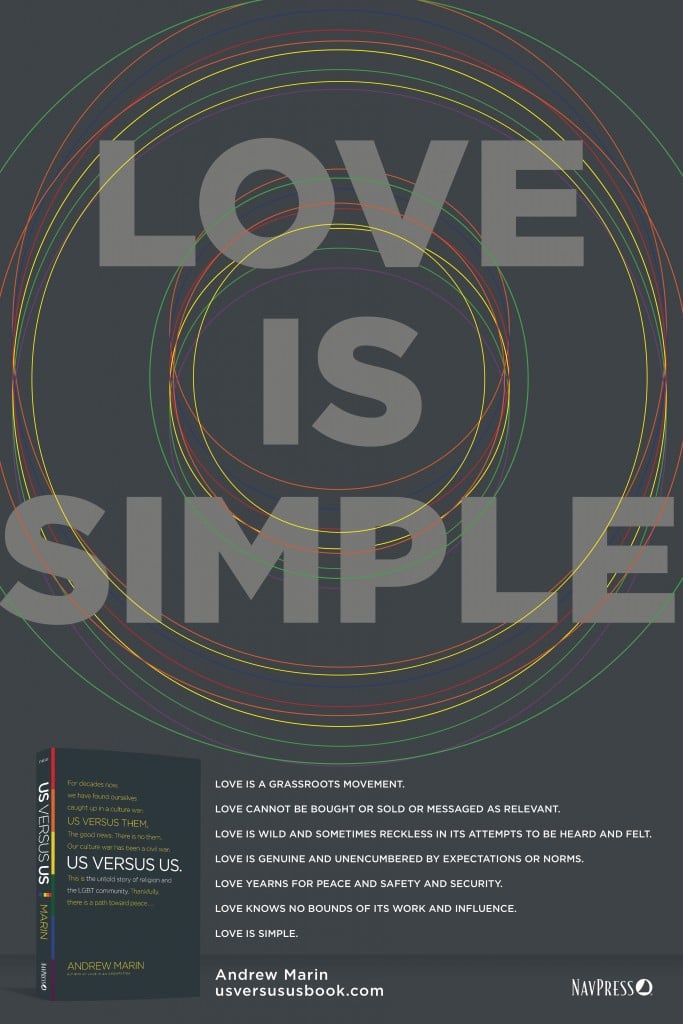The following post is by Jason Bilbrey, our Director of Pastoral Care here at The Marin Foundation. You can read more from Jason at his blog, www.jasonbilbrey.com or follow him on Twitter at @JasonBilbrey.
Last Monday at our biweekly Living in the Tension gathering, one of my friends explained the experience of being a gay Christian like “having a sign around my neck.” There’s a constant pressure, she explained, to prove herself as both gay and Christian. To some, she isn’t be considered gay enough. To others, not Christian enough. “I feel like I’m not allowed to have a bad day,” she said, “because to so many people I’m representing the entire gay Christian community. What will they believe about other gay Christians if I screw up? ”
There’s a real danger in iconisizing people–in seeing them as the embodiment some larger idea. I think we all do it to some extent. Labels or defining identities become the blank canvas onto which we project our assumptions and curiosities.
Exhibit A: Gene Robinson’s divorce. Gene Robinson’s 2003 ordination made him the first openly gay Bishop in the Episcopal church, and a lightning rod in the debate over same-sex relationships in the church. He and his partner of 25 years, Mark Andrew, announced their divorce on Sunday. So what does it say about gay marriage when a prominent and historic member of clergy, whose same-sex marriage was widely regarded as a milestone in the gay rights movement, ends that marriage in divorce? That’s the question which seems to have prompted this line from Robinson’s piece in the Daily Beast:
“It is at least a small comfort to me, as a gay rights and marriage equality advocate, to know that like any marriage, gay and lesbian couples are subject to the same complications and hardships that afflict marriages between heterosexual couples.”
So what does Robinson’s divorce say about same-sex marriage? That it’s just as difficult and prone to failure as opposite-sex marriage. In other words, absolutely nothing.
When British pop star Jesse J says her bisexuality was “just a phase,” what does that say about bisexuality? Again, nothing.
I worry about this. About complicated people being made into concrete symbols. About individuals losing themselves in the identity of an adopted label, especially surrounding issues of sexuality and relationships.
For my gay friends whose commitment to celibacy or singleness has become very public just by the nature of the attention paid to the LGBT community, screwing up and, say, having a one-night stand brings much more scrutiny than the fumbles of their straight counterparts.
Of course some people actually want to be publicly accountable to that thing they are known for. Stanley Hauerwas, the theologian and ethicist, is fond of saying, “I’m a pacifist because I’m a violent son of a [gun]….But by avowing it, I create expectations in others that hopefully will help me live faithfully to what I know is true but that I have no confidence in my own ability to live it at all.” He’s willingly subjecting his behavior to the attention and scrutiny of the public. It’s bold–but then, of course, so is he.
Derek Webb, whose albums are honestly the only Christian music I own, argues that this is actually what marriage is: a request for public accountability. Here’s what he had to say about his own marriage to fellow musician Sandra McCracken, which inspired his song, The Vow:
“I’m getting to an age and station of life where i feel like I’m starting to notice the cracks in creation all around me, primarily in the relationships in my immediate circle of friends. So as a protest against that brokenness, I wrote a song basically painting myself into the corner, which is essentially what marriage is.”
So when we read this week that Derek and Sandra are divorcing, I think we’re wise to remember that he’s talking and singing about truths that are not disproven by his (or our) inability to live up to them. We can both acknowledge our brokenness and protest against it too.
People aren’t living embodiments of ideas. They make for horrible icons.
To end this post on a positive note, here’s a video also making headlines this week. It’s Janet Mock, trans activist and author of Redefining Realness, asking her cisgender host all the questions she normally gets during interviews. It’s so impressive to watch her navigate her role as a public figure representing the trans community and how neatly she defines the limitations and dangers of that role. It’s very clear that she refuses to trade her individuality for icon status.
But it’s really our responsibility not to inject her or anyone’s life with undue meaning.
Much Love.











